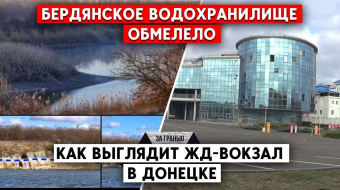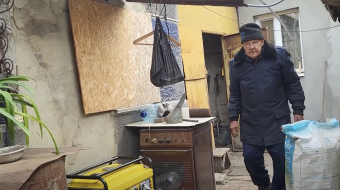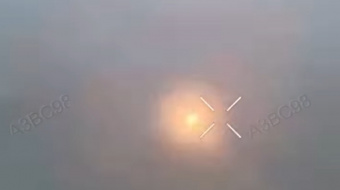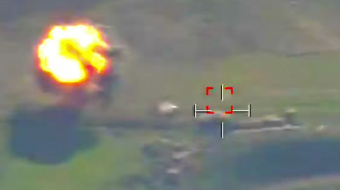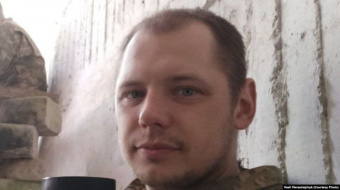Donetsk residents about two years of “DPR” occupation: everything is either destroyed or damaged
Donetsk residents about two years of “DPR” occupation: everything is either destroyed or damaged
Unemployment, terminated building processes and endless festivals - this is the result of the occupation of a city which was so dynamic and vibrant not so long ago.
Two years ago a convoy of militants and their machinery left Slovyansk and Kramatorsk, covered the way of one hundred kilometres without any obstacles and entered Donetsk. The war from TV became real for the residents of the city. During these two years, “DPR” militants turned it into hell which is called “everyday life of a young republic”. Donetsk is not a busy megapolis any more, now it is a gloomy provincial town whose industry is dead and population struggles for survival, writes “The Segodnya”.
Senior residents. Struggle for survival is, probably, the main task of Donetsk residents now. The situation with employment is really hard. There is no one to replace doctors, teachers, engineers or bus drivers who have left the city. The average salary is 3-8 thousand rubles (about 100 dollars). It can be said, that retirees are lucky: some of them managed to register for a Ukrainian pension which they get on Ukrainian territory and get “DPR social allowances” whose amount is practically the same. Unlike pensions for disabled or social allowances for children, it is paid on time. “It looks like they created a state for the elderly. They get pensions and subsidies. But who is going to care about children? There are no camps for them, nursing schools close down, there are no teachers and classes at schools are merged. There is not a single new playground for children in the city”, says Mariya Mazur, Donetsk resident.
No building processes. Building sites got abandoned in 2014. Buildings are not restored. Only roads are refurbished though after some time they are damaged again as militants’ machinery moves along them.
Back in USSR. It may take you from several hours to two days to cross the demarcation line, a big part of this time will be spent waiting around at checkpoints. Bus connection with the occupied territory stopped in the summer of 2015. The situation with public transport in Donetsk itself is getting worse. “There are no buses after 8 p.m. There are no machines which sell tickets at bus stops either, though booths with ladies inside who do this have appeared. So, we are going back to USSR”, says Ilya.
No mobile connection. One Ukrainian mobile operator stopped working on occupied territories, so, militants confiscated its equipment and created their mobile operator “Phoenix”. “All “DPR law enforcers” and “ministry of emergency situations” were bound to use it. Other operators have big problems with connection, the same is true for the Internet”, says Yelena Turovskykh.
Boredom. Young people do not feel comfortable. “There are neither films, nor good clubs, only restaurants. The peak of cultural life is one more Kobzon concert and endless festivals without any reason on the main square. It can be said that Donetsk is scary, grey and boring. It is impossible for students even with “DPR diplomas” to find a job in the native city, says Oleh Maltsev. “It looks like everything is done to make young people go to the war as there they can get good money.”
“We live in a parody world”. Industry and business on the occupied territories are dying. A lot of mines have been flooded, some are going to be flooded, only a couple of them still work. Donetsk Metallurgical Plant has stopped making steel. A milk plant and a baking one work a couple of days a week, small amount of sausage is produced in Horlivka, some sauces are made in Makiivka. Business which works with partners from the Russian Federation (imports goods into “L/DPR”) opens accounts in Ukraine and works according to Ukrainian documents, the goods are not paid for directly thus. “Otherwise, we will be considered importers as in Russia they think we are Ukrainian entrepreneurs”, says Viktor Kalachevsky. “Then, prices for our goods will be skyhigh and no one will buy them. Even now hardly any people do now.”
Everything that was created in the Donbas before the war is either damaged, or spoilt. Occupied cities have neither airports, nor postal service, nor bus or railroad connection (but for a couple of diesels which go to the Russian border). There are no banks (“DPR central bank” works only inside the “republic”) and no prospects of economic growth. “We live in a parody world! There is postal service, but you can send parcels only to neighbouring Makiivka or Horlivka. There is a bank, but only a crazy person will bring their money there. There is mobile connection but it looks more like walkie-talkie, it is impossible to get through to other operators”, says Larysa Prykhodko.
Not enough doctors. There are not enough doctors or nurses in Donetsk hospitals and medicines are extremely expensive. “DPR” claims that medical services they provide are free, however, Donetsk residents spend huge sums of money on medicines they are prescribed. There is no insurance medicine, sick leaves are not paid. “Doctors tell us themselves: if you can, buy medicines on peaceful territories and get treatment there. Everything that you can buy in the chemist’s is produced in Russia and it is often harmful, not healing. People have strong allergies to ordinary medicines”, says Anna Lyaschenko.
New service "Explain Ukraine". This is a daily mailout of three articles which were written about the situation in the Donbas by Donbas journalists and translated into English. Honest vision of people who work in the field is unbiased and fresh which is crucial in the world which is full of desinformation and propaganda. We try to share this vision in out daily mailout. You can subscribe here.











